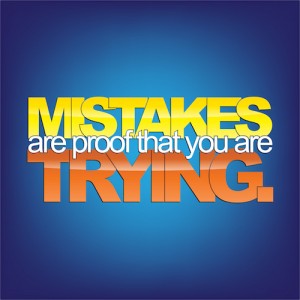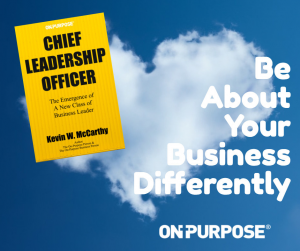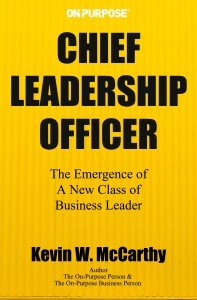Mistakes are inevitable, yet the fixation on perfection in our society is debilitating.
Whether it be lawmakers, bakers, payroll makers, or homemakers, the fear of making a mistake can flatten one’s life into a “safe zone” of mediocrity. Risks and loss are inevitable when one ventures into life or work with a sense of wonder and discovery. You are better off to have a mistake than to miss-a-take at what could be.

It is a mistake to view mistakes as merely mistakes.
Instead, mistakes can lead to retakes and become invaluable guideposts to life and growth of one’s personal growth and leadership. Mistakes open doors to learning or blaze new pathways that might otherwise go undiscovered.
- “Mistakes” enabled Thomas Edison to discover 9,999 ways a light bulb couldn’t work. And in the process, he developed a reliable means of tracking research and increasing his knowledge of elements.
- “Mistakes” created the Post-It® Note. “Mistakes” often open doors to new frontiers of thought, use, and development.
Just Say It!
“Yes, that’s my mistake.” These are the four magic words that when said sincerely are your path to a healthier and happier life without the stress and strain imposed by the pride of perfection and the need to be right. It will take practice and some hard swallowing, but you’ll be amazed at how much simpler life becomes.
Problem ownership is your best chance to open the door to mercy, grace, and forgiveness. The risk of owning up has a downside of consequences, but it also has the upside of building trust and rapport. In practical terms, when the mistake is out in the open versus covered-up, a solution or fix will happen sooner and with less cost.
Take Your Mistakes Like A Leader
When we make a mistake, our natural reaction is to be defensive. We retreat and distance ourselves from the mistake and then look to whom we can pass off the blame. Shedding responsibility for a mistake may momentarily soothe the psyche, but each pass of the buck creates a self-inflicted bite upon one’s soul.
Admittedly, most of us prefer to cover our mistakes under a blanket of embarrassment, shame, or self-pity. Stopping dead in our tracks at our mistakes to point fingers at people, circumstances, and systems invites a bitter and negative stronghold to enter our emotional and spiritual system. We’re stuck in a self-imposed unhealthy manner of living that taints every aspect of our lives. Now that’s a tragic and true mistake!
Compounding our initial mistake with another more sinister mistake knits a habit of ill-fitted denial into the fabric of our lives.
Do this too often and we live in a straitjacket of fear of failure and bitter close-minded defensiveness. In time, the fear of exposure arrests our maturity and so we become the very thing we fear most—a dull and ordinary blank slate of a person with no distinguishing quality. We live small (which is different from living humbly). Repeating these actions and circumstances reinforces a debilitating pattern and fuels a vicious cycle of defeat.
 Image via Wikipedia
Image via Wikipedia
A Penny For Your Thoughts
Life need not be this way. Instead, what if mistakes are friends in the form of hard lessons? They’re not roadblocks, per se, but guideposts revealing a better way to navigate life. Mistakes can help us know who we are and what we’re called to be about with our special gift of time on the planet.
Mistakes are an odd currency of redemption. Their true value comes with a cost in the form of a workout where we have to face ourselves. Throwing “good money after bad” is viscerally upsetting. We’ve been given an intellectual and spiritual capacity to rise higher and dig even deeper to strengthen our condition regardless of the proposed outcome. It only requires us to admit our mistake and gain the clarity and opportunity to set things right—stronger and better than before in some cases.
Wisdom is often the byproduct of mistakes, provided we invest in processing the lessons to be learned. Here’s where a mentor or coach can help us reflect and grow. If you’re seeking that mentor or coach, perhaps we can help you?



